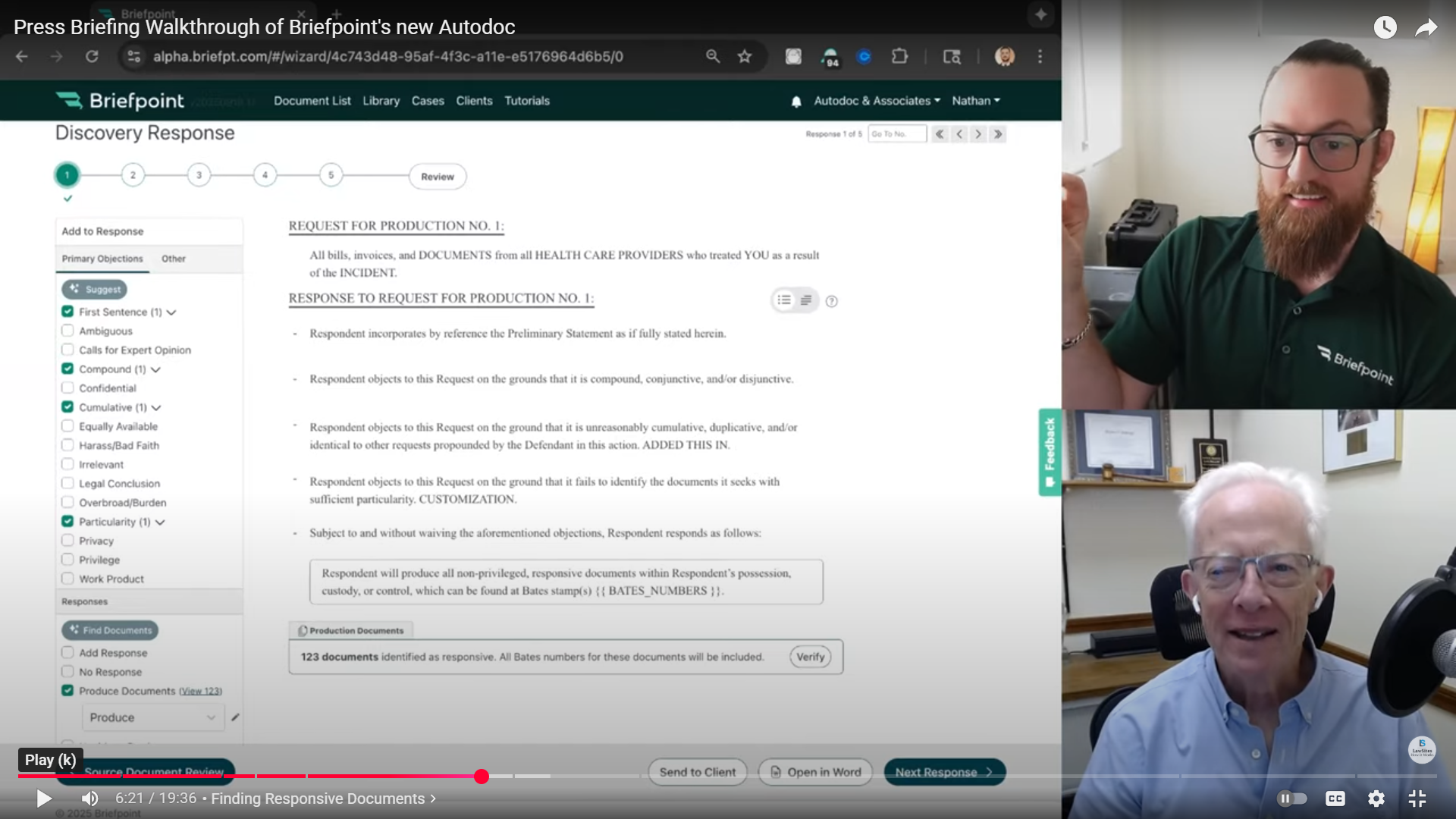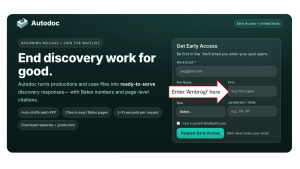Briefpoint, a legal technology company that uses AI to automate much of the drudgework of propounding and responding to discovery requests in litigation, today introduced Autodoc, a new AI-powered feature that automates the process of responding to document-production requests — finding and assembling the responsive documents in seconds and drafting the fully formatted response, ready to be served on opposing counsel.
Briefpoint founder and CEO Nathan Walter said the new tool represents what he calls “a step towards full e-discovery,” specifically designed for cases with 10,000 to 20,000 documents or fewer. These represent the vast majority of litigation matters — ones that generally do not justify the expense of traditional e-discovery platforms.
Walter demonstrated the new tool for me last week, and you can see that briefing in the video below.
Also, read on to find out how you can get priority on the waitlist to get access to the new tool.
How Autodoc Works
As you can see in the video, using Autodoc is simple. Users upload their case documents along with opposing counsel’s requests for production. The system then processes the entire document collection, creating what Walter describes as “a document management system based on your upload.” This preprocessing can take several hours but results in organized folders that break down complex PDFs into individual documents with proper titles and organization.
When responding to specific requests for production, users can click a “Find Documents” button. Autodoc then searches through the entire production to identify responsive documents. The system provides two key outputs: a production package with properly Bates-numbered documents, and a Word document containing formatted responses with objections and substantive answers citing responsive documents by their Bates numbers.
Here are the basic steps in more detail:
- Upload the case documents. This includes all documents you would normally produce in discovery — case reports, emails, contracts, and any other relevant files. This initial upload triggers an extensive preprocessing phase that can take several hours.
- Upload the complaint. The system uses the complaint to understand the case context, parties involved, causes of action, and timeline of events.
- Document processing. The document upload triggers a behind-the-scenes processing phase that can take several hours. During this phase, the system breaks multi-document PDFs into individual files, creates descriptive titles for each document, organizes the documents into logical folders, and builds an searchable database of all content.
- Upload opposing counsel’s request for production (RFP). Briefpoint extracts individual requests from the RFP and populates case information like parties and jurisdiction for the caption page.
Once you have done those steps, you are ready to respond. As you review each of the extracted requests, you have three options:
- Select objections from Briefpoint’s objection menu.
- Click “Suggest” to have the system automatically generate appropriate objections.
- Click “Find Documents” to trigger the AI search.
If you click Find Documents, then the system analyzes the specific RFP language, relevant definitions, and case summary, and searches through the entire document production to return all responsive documents.
You can verify the results in several ways. You can view all the documents identified as responsive and review each one. You can also view the color-coded folder structure to see which folders the documents came from and which had no documents. If a folder shows no responsive documents but its name suggests it might, you can easily see that and manually check the folder.
At any any point in the process, you can also send a specific request to your client, along with a note from you. The system can translate those messages into Spanish and the client’s response back into English.
One you have finished with each production request, Autodoc will create the final production package for you, ready for service on opposing counsel. This includes:
- Bates-stamped document package.
- ZIP file containing all responsive PDFs.
- The properly formatted response document, including any objections and substantive responses citing specific documents by Bates numbers.
The entire process, which Walter notes could traditionally take 30 minutes per request for manual review and drafting, can be completed in seconds per request with the AI system, while maintaining the ability for attorney review and verification at every step.
Beyond Basic Document Retrieval
Autodoc goes beyond simple keyword matching to handle more complex legal requests. Walter demonstrated the system’s ability to respond to a nuanced query such as, “All documents that support your first cause of action for negligence.” Using the uploaded complaint as its basis, the system “understands” the basic facts and legal theories involved in the case and can identify documents supporting specific legal arguments.
The tool includes several verification features, allowing attorneys to review selected documents and identify folders the system searched versus those it didn’t examine. A planned update will highlight folders most likely to contain relevant documents that weren’t initially produced.
Comprehensive Discovery Platform
Autodoc builds on Briefpoint’s existing platform, which already enables users to draft outgoing discovery requests and responses to various types of discovery. The company serves attorneys on both plaintiff and defense sides across all 50 U.S. states, Washington D.C., and all 98 federal district courts.
The system includes client communication features that translate complex interrogatories into plain English (and Spanish) to facilitate client responses, replicating the traditional attorney-client information gathering process through AI.
While the current version doesn’t automatically identify privileged documents, Walter outlined planned features for 2025 that will allow attorneys to search for attorney names and designate privileged materials before production. Future updates will also include redaction capabilities for personal identifying information and other sensitive content.
“The overarching goal of Briefpoint is to completely eliminate discovery work from litigation,” Walter said.
Priority Waitlist Access
For existing Briefpoint customers, Autodoc will be added at no additional cost. New subscribers will receive 2,000 page processing credits monthly per attorney account, with options to upgrade or purchase additional page packs for larger productions.
The feature launches today for users who were already on the waitlist. Other attorneys interested in trying it can sign up at briefpoint.ai, with priority access available for those who reference having learned about it here.
Here is how: At the sign-up screen to join the waitlist, where it asks for the name of your firm, enter “Ambrogi.” You will get moved to the top of the list.
 Robert Ambrogi Blog
Robert Ambrogi Blog
